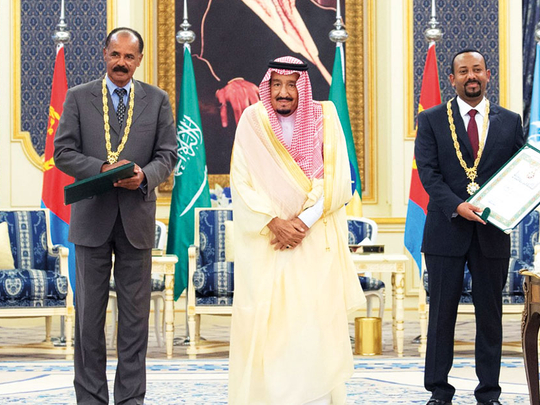
Dubai - The peace agreement signed by Ethiopia and Eritrea on Sunday in Jeddah is a materialisation of extensive Saudi back-channel diplomacy to maintain stability and development in one of the world’s most strategic locations, analysts have said.
Saudi Arabia’s ambition to become a global logistical and shipping hub “can only be realised if Horn of Africa is at peace,” Secretary-General of the King Faisal Centre for Research and Islamic Studies Saud Al Sarhan told Bloomberg. “Hosting the signing of the Ethiopian-Eritrean peace agreement in Jeddah is an important sign of Saudi Arabia’s commitment to regional peace, security, and the freedom of navigation in the Red Sea.”
Ethiopian Prime Minister Abiy Ahmad and Eritrean President Isaias Afwerki signed the Jeddah Agreement on Sunday in the presence of King Salman Bin Abdul Aziz, UN Secretary-General Antonio Guterres and UAE Foreign Minister Shaikh Abdullah Bin Zayed Al Nahyan. It’s the second peace deal the two states have made since they ended decades of enmity in July.
- Saud Al Sarhan | Secretary-General of the King Faisal Centre
The UAE, which has played a key role in bringing the two countries together, on Sunday welcomed the Jeddah Agreement and praised the efforts made by King Salman. Ethiopian leader Ahmad has praised the help he received from His Highness Shaikh Mohammad Bin Zayed Al Nahyan, Crown Prince of Abu Dhabi and Deputy Supreme Commander of the UAE Armed Forces, who also enjoys great influence in Asmara, the Eritrean capital.
Ahmad said one of the biggest priorities for Shaikh Mohammad was peace between Ethiopia and Eritrea.
The rapprochement between the two countries was, in fact, the culmination of a year of back-channel talks. The UAE’s increasing influence in the Horn of Africa underscores the shifts underway in the continent, where China now challenges the historic power of western nations and where Russia, Brazil and the UAE and Gulf states are growing in prominence.
UAE Minister of State for International Cooperation, Reem Al Hashemi, told an event in Washington in July that UAE had “played a humble role in trying to bring these two countries together”.
Earlier this year, Al Hashemi met with Ethiopian Ahmad’s predecessor, Hailemariam Desalegn, in Ethiopia.
When Ahmad took office in April, UAE ramped up that effort. A month after taking office, he visited Abu Dhabi to meet Shaikh Mohammad. Officials from Emirates Red Crescent later visited Ethiopia to discuss aid projects with Ahmad. Those visits complemented efforts by Washington to move towards a restoration of relations between Ethiopia and Eritrea.
Eritrea and Ethiopia declared peace in July and agreed to reestablish economic links after an unprecedented summit between the neighbours’ leaders ended decades of enmity. The states fought a 1998-2000 border war that claimed as many as 100,000 lives and left thousands of Ethiopian and Eritrean families divided. The two sides have clashed sporadically in the years since and accused each other of supporting rival rebel groups.
The conflict ended in an uneasy peace with Eritrea, which earlier fought a decades-long war of independence from Ethiopia.
Yet that suddenly changed with the election of Ahmad as prime minister. A whirlwind of talks suddenly ended the long conflict between the two nations in July, with telephone calls and flights suddenly possible between the two nations.
It was particularly surprising for Eritrea, a closed-off nation of 5 million people ruled by Isaias since 1993. Eritrea’s system of compulsory conscription that led thousands of Eritreans to flee. Ethiopia is home to 105 million people.












